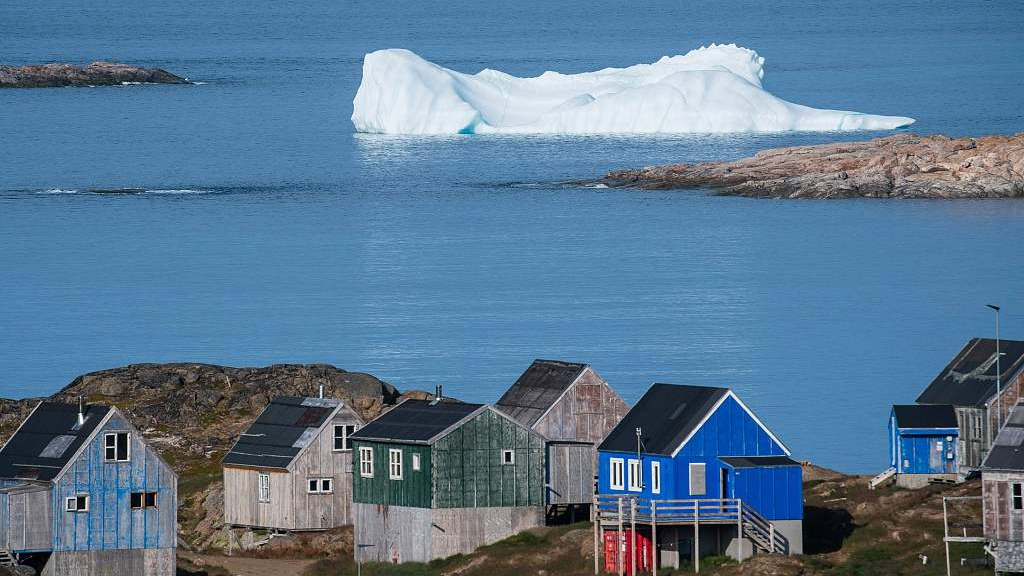

Editor's note: Tom Fowdy is a British analyst of political and international relations and a graduate of Durham and Oxford universities. He writes on topics pertaining to China, the DPRK, Britain and the United States. The article reflects the author's opinions, and not necessarily the views of CGTN.
A week ago an unusual report had surfaced that President of the United States Donald Trump had seriously contemplated purchasing the autonomous country of Greenland from Denmark. When Copenhagen's leadership rejected Trump's proposal as "absurd" – the White House today responded by lashing out at the Scandinavian country and postponing a scheduled presidential visit in the next two weeks, as if to imply the entire visit was premised upon a deal to purchase the territory (despite a denial by the U.S. State Department).
The president then proceeded to attack the country for inadequate military spending and demanded they pay more towards their NATO obligations than to simply rely on "American protection." In the meanwhile, the world largely stood shocked and stunned at the president's comments, with many analysts branding it a dark day for American diplomacy.
What is behind Trump's newly found obsession with buying Greenland? It's time to recognize that as ridiculous as it sounds, this is no joke. His initial remarks did not find their way into the press by accident or coincidence. Instead, his comments are a direct declaration of American strategic intent, even if the methods are his own. America has a history of territorial expansion, and seeking to confront Russia and China, the United States wants to increase its own strategic and military supremacy over the Arctic Circle.
To do this, the direct incorporation of Greenland as a territory of the United States would consolidate U.S. hegemony over the Northern Hemisphere. Given this, it seems if such is not possible the President's follow up demands that Denmark increase its military spending is an attempt to substitute for such by extending the power of the NATO alliance. Either way, what otherwise seems ridiculous embodies some very serious goals – and those can't be dismissed.
Although it seems completely out of place in modern times, the idea of the United States acquiring territory to consolidate hegemony over regions of the world is not as unusual as it looks; in fact such constitutes the entire history of that country until the 1950s. Throughout the 18th and 19th centuries, American leaders sought to persistently expand their country from the Atlantic to the Pacific under the mantra of "Manifest Destiny" – both purchasing and forcefully annexing territory in the process. The vision was coupled with the "Monroe Doctrine," which designated the U.S. as the only rightful power in the Americas.

Denmark's Prime Minister Mette Frederiksen talks to the press after U.S. President cancelled his state visit after her government said its territory Greenland was not for sale in Copenhage, Denmark, August 21, 2019. /VCG Photo
Thomas Jefferson would purchase the enormous land of Louisiana from France and then later Alaska from the Russian Empire; it would fight a war against Mexico and seize what are now California, Arizona, Nevada, New Mexico and Utah. Even beyond its shores, it would annex Hawaii, the Philippines and many more territories in the pacific, all of which purposefully laid the foundations of global American power.
Thus, in the age of "Make America Great Again" – a president as unconventional and seemingly obsessed with reasserting U.S. hegemony of Trump has been happy to rekindle the old dream of expanding territory for strategic and military purposes. A handful of observers have noted that the Arctic Circle is becoming a new military flash point in America's bid to uphold military hegemony against countries it deems "challengers" including Russia and China.
This scenario makes the island of Greenland, freezing and home to only 50,000 inhabitants, an extremely strategic location. There is evidence America is taking the island's position seriously. Last year, the U.S. State Department blocked China from financing three civilian airports in the region, claiming they were for "military purposes." Thus the idea that Trump aspires to acquire the island for the United States and militarize it accordingly is by no means unreasonable in his strategic calculus, even if the idea is a non-starter. Denmark on its own does not have the resources or capabilities to make it useful on behalf of NATO, which is why Trump likely hit out at them over military spending.
Given this, we should interpret Trump's recent behavior and moves regarding Denmark as regretfully serious. It all sounds a bit silly, but the American interest in acquiring Greenland in pursuance of their own bid to maintain worldwide military supremacy is not a joke. American history is defined almost solely by territorial expansion for strategic ends. It may have fallen dormant, but Trump has very much rekindled an old flame for strategic ends. This illustrates as a whole just how far this administration is willing to go to reassert unilateral hegemony over the world.
(If you want to contribute and have specific expertise, please contact us at opinions@cgtn.com.)

Copyright © 2018 CGTN. Beijing ICP prepared NO.16065310-3
Copyright © 2018 CGTN. Beijing ICP prepared NO.16065310-3